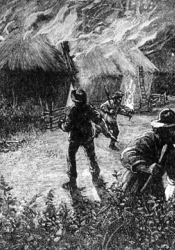The Corn Laws of 1815
The Corn Laws were tariffs and restrictions put in place from 1815-1846 in the United Kingdom. The Corn Laws caused the price of ‘corn’, which also includes barley, corn, wheat, and all other grains, to increase. The Laws were designed to protect English farmers from inexpensive foreign imports of grain. This was a direct response to the Napoleonic wars. The British blockade of continental Europe led to increased profits for their homelands farms, and the farmers wished to retain this higher rate of profit.
These heavy restrictions and later taxes on any corn or grain which could enter the county made it so the British people could only buy grain from within its own borders. This raised the price of bread and the overall cost of living. The Corn Laws limited the disposable income of the British people as a whole and limited total economic growth. The working class was unable to afford anything other than their food, forcing them to stop buying manufactured goods and reducing leading manufacturing profits. However, the Corn Laws made landowners wealthier. At the time, wealthy landowners had the exclusive right to vote, despite making up just 3% of the population. So, even though the Corn Laws hurt the working class, the wealthy elite benefited. The wealthy in parliament did not care for the plight of the working class for a long time which is why these restrictions went on for so long before Britain adopted a more free trade policy like what we see today. The suffering of the time led to riots, but it took time for real organization to legally address the issues. In 1832, the right to vote was extended to a sizable portion of the merchant class, leading to the eventual conclusion of the Laws.
Sources:
Edited by David Ross, British Express. https://www.britainexpress.com/History/victorian/corn-laws.htm
Williamson, Jeffrey G (1 April 1990). "The impact of the Corn Laws just prior to repeal". Explorations in Economic History. 27 (2): 123–156. doi:10.1016/0014-4983(90)90007-L.
“Great Reform Act.” The National Archives, 1 Jan. 1970, http://www.nationalarchives.gov.uk/pathways/citizenship/struggle_democra....

